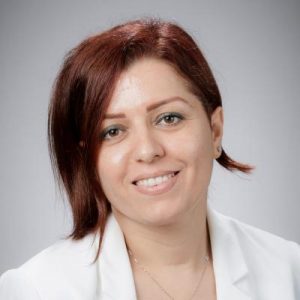
As part of its Distinguished Lecturer Series, the Institute of Computing and Cybersystems will present a virtual talk by Zahra Motamed, McMaster University, on October 7, 2022, at 3:00 p.m.
At McMaster University, Motamed directs the Cardiovascular Research Group and is a Professor in the Department of Mechanical Engineering. She holds associate faculty memberships in the Department of Computing and Software, the School of Biomedical Engineering, and the School of Computational Science and Engineering. She is a member of the Thrombosis & Atherosclerosis Research Institute (TaARI) and McMaster Institute for Research on Aging (MIRA).
Moreover, Dr. Motamed is a research affiliate faculty member at the Institute for Medical Engineering & Science and Harvard-MIT Biomedical Engineering Center at MIT (Cambridge, USA). Her research interests are mainly in the areas of translational and basic cardiovascular mechanics to develop long-needed quantitative diagnostic, predictive, and intervention-optimization tools for cardiovascular diseases to support personalized interventions and clinical decision making. A major part of her work has been dedicated to development and validation of advanced multi-scale computational-mechanics and imaging-based algorithms for patient-specific modelling of cardiovascular system with the following objectives:
Title of presentation: The critical role of diagnostic, monitoring, and predictive tools in patients with valvular disease and TAVR
Abstract: The main functions of the cardiovascular system are to transport, control and maintain blood flow in the entire body. Abnormal hemodynamics greatly alters this tranquil picture, leading to initiation and progression of disease. These abnormalities are often manifested by disturbed fluid dynamics (local hemodynamics), and in many cases by an increase in the heart workload (global hemodynamics). Hemodynamics quantification can be greatly useful for accurate and early diagnosis but we still lack proper diagnostic methods for many cardiovascular diseases because the hemodynamics analysis methods that can be used as engines of new diagnostic tools are not well developed yet. Furthermore, as most interventions intend to recover the healthy condition, the ability to monitor and predict hemodynamics following particular interventions can have significant impacts on saving lives. Despite remarkable advances in medical imaging, imaging on its own is not predictive. Predictive methods are rare. They are extensions of diagnostic methods, enabling prediction of effects of interventions, allowing timely and personalized interventions, and helping critical clinical decision making about life-threatening risks based on quantitative data. Dr. Motamed and her team has developed innovative non-invasive image-based patient-specific diagnostic, monitoring and predictive computational-mechanics framework for patients with valvular disease and TAVR. Currently, none of the above metrics can be obtained noninvasively in patients and when invasive procedures are undertaken, the collected metrics cannot be by any means as complete as the results that Motamed lab’s framework provides.
Affiliations:
- Zahra Motamed, Ph.D., P.Eng., Joseph Ip Distinguished Engineering Fellow
- Assistant Professor & Director of Cardiovascular Research Group
- Department of Mechanical Engineering | Department of Computing and Software
- School of Biomedical Engineering | School of Computational Science and Engineering
- Thrombosis & Atherosclerosis Research Institute | Institute for Research on Aging
- McMaster University, Hamilton, ON, Canada
Biography: Dr. Motamed directs the Cardiovascular Research Group and is a Professor in the Department of Mechanical Engineering at McMaster University (https://www.motamedlab.com/). She holds associate faculty memberships in the Department of Computing and Software, in the School of Biomedical Engineering, and in the School of Computational Science and Engineering. She is a member of the Thrombosis & Atherosclerosis Research Institute (TaARI) and McMaster Institute for Research on Aging (MIRA). Moreover, Dr. Motamed is a research affiliate faculty member at the Institute for Medical Engineering & Science and Harvard-MIT Biomedical Engineering Center at MIT (Cambridge, USA). Her research interests are mainly in the areas of translational and basic cardiovascular mechanics to develop long-needed quantitative diagnostic, predictive, and intervention-optimization tools for cardiovascular diseases to support personalized interventions and clinical decision making. A major part of her work has been dedicated to development and validation of advanced multi-scale computational-mechanics and imaging-based algorithms for patient-specific modelling of cardiovascular system with the following objectives:
- To develop long-needed quantitative diagnostic, predictive, and intervention-optimization tools for cardiovascular diseases to support personalized interventions and clinical decision making
- To design, evaluate and optimize cardiovascular devices such as transcatheter heart valves and vascular stents
- To uncover causes of cardiovascular pathologies through solving complex biomedical problems
- To re-classify diseases and to establish guidelines for clinical interventions
- To lead multidisciplinary collaborative efforts to translate engineering-based findings and developments into clinical practice
- To develop monitoring tools for cardiovascular health to be integrated in future smart houses and smart vehicles
- Due to the interdisciplinary nature of her research, Dr. Motamed extensively collaborates with engineers, clinical scientists, surgeons and cardiologists in Canada, the USA, and Europe.
Dr. Motamed is a Joseph Ip Distinguished Engineering Fellow. She serves as the Chair of the NSERC Research Tool and Instruments (RTI) Selection Committee for the Competition 2021. Dr. Motamed is a member of the Editorial Board in the Journal of Frontiers in Bioengineering and Biotechnology. She is a handling Editor in Frontiers in Cardiovascular Medicine and a Guest Editor in Frontiers in Bioengineering and Biotechnology in Novel methods to advance diagnostic and treatment value of medical imaging for cardiovascular disease. She has been a scientific consultant to a number of medical device companies.